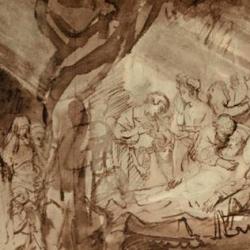Raising Priests and Kings, Deuteronomy 6:1-25
INTRODUCTION
We have been applying the sequence of priest, king, and prophet to Israel?s history and to our own biographies. God raises us to maturity by leading us through a period of service and a period of rule into an eldership where we guide others out of our experience and wisdom. Today, we will apply this same paradigm to the life of a child.
THE TEXT
?Now this is the commandment, and these are the statutes and judgments which the Lord your God has commanded to teach you, that you may observe them in the land which you are crossing over to possess . . . .?E(Deuteronomy 6:1-25).
INFANTS
Children need to be welcomed into the world. When children are brought into the church, Jesus embraces them in baptism (cf. Luke 18:15-17), and they are brought into the bosom of their ?mother,?Ethe church (see Galatians 4:26). When children are brought into the family, they need to be embraced. Mothers wouldn?t need to be told this. Of course, we need to be wise about when we pick up and hold infants. But in general, mothers should follow your God-given desire to hold and cuddle your infants. Dads, unfortunately, sometimes do need to be told to hold their babies; so I?m telling you.
JUNIOR PRIESTS
During the priestly stage of Israel?s history, the Lord gave very detailed instructions to His people, and also punished them immediately when they sinned (Leviticus 10; Numbers 16). When our children are very young, they need to have clear rules. The basic rule is, ?Obey your father and mother,?Eand the other standing rules that come from this should be relatively simple and easy to remember. Also, young children need attentive oversight and immediate consequences to their actions. Expect obedience to your instructions, and spank them if they don?t obey.
During her priestly stage, Israel?s instruction took the form of stories, rules, and rituals. The Israelites in Egypt knew all about the stories of the patriarchs, and the Israelites in the time of Joshua and the Judges were nourished by the story of the exodus. God also gave His law to Israel. And God gave His people detailed instructions about rituals and ceremonies for His worship. When our children are young, our education of them should take the same form: Tell them stories, especially from the Bible; give them clear rules; and train them in regular patterns of life ?Ethe rituals of bed-making, teeth-brushing, cleaning up, table manners.
PRINCES AND PRINCESSES
During Israel?s kingly stage, Israel, and especially the king, was given more authority to rule and make her own decisions. Children in their pre-teen and early teen years still need to obey direct commands, and using the rod is still necessary. But children at this age don?t need to same kinds of oversight as little children, and parents can leave certain decisions up to the child. In fact, parents should leave decisions up to the child, since they need training in making their own decisions as adults.
During Israel?s kingly period, the instruction took the form of proverbs. Children at these ages can learn think in more abstract terms, and can learn to apply general instructions in a specific situation. Also, when dealing with the kings, the Lord often left them to the consequences of their own sin, rather than bringing severe judgment immediately. After David?s sin with Bath-sheba, their first child died, but the more serious consequences unfolded over a long period (2 Samuel 11-12). At this stage, it is wise for parents to stand back from intervening with discipline and let children suffer the consequences of their own sins.
JUNIOR PROPHETS
Prophets, as we saw last week, are not only wise, but also are able to guide others on the way of wisdom. We should be raising our children so that they will not only serve faithfully and rule wisely, but also be able to communicate wisdom to others ?Eeventually to their children, spouses, employees, and so on. When children reach their later teens and leading up to their leading home, parents should give them opportunities to take on more adult responsibilities ?Etaking care or teaching younger siblings, handling their own finances, and so on.
Prophets were guided by the word of God and the revelation of the Spirit, but they also spoke out of the wisdom of their experience with God. Our instruction to our children at this stage often takes the form of giving them advice and coaching them through challenges. Teens are going through biological changes that are making them physically adults, and those changes can be confusing. Parents must discuss puberty and sex with their teenage children.
CONCLUSION
Several additional thoughts should be added. First, it is essential that parents celebrate and embrace the changes that happen in their children. Many parents sentimentally cling to the time when their children were very small, and try to perpetuate that stage as long as possible. This is ungodly, and nothing perpetuates immaturity like treating a teenager like a baby; nothing exasperates older children more than this. We should delight in infants, rejoice at toddlers, celebrate our 10-year-olds, and sing in praise for our teens.
Second, success in raising children depends on many intangibles that I classify under the heading of ?atmosphere.?E We must labor to establish an atmosphere of joy, celebration, love, service, and discipline in the home. As more children are born into a home, they begin to breathe this atmosphere and begin to live it out. You can take steps to establish the right atmosphere by regular prayer, family singing and Bible study, and family meals. Worship is the center of the life of the Christian family, and the same should be at the center of the life of the home.
Third, fathers especially must be diligent to express their affection and love for their children. American men are often reluctant to make a show of affection; get over it. Tell you sons and your daughters you love them, regularly; hug them and kiss them, regularly, even if they think you?re sloppy and try to pull away. Take time with each child individually so that each knows the affection you have for him or her individually.
Finally, being a king as a parent means suffering with others. That is part of parenting: We suffer as our kids make mistakes, fall down, fail, make bad decisions, suffer the consequences. This is part of Christian, of Christlike, parenting.
Catechism for Little Saints
For small children: What does God want you to do?
To honor and obey my parents, and accept discipline with joy and thanks.
For older children: What does God want you to do?
To obey my parents, and to listen to them so that I can grow up to be a mature Christian.











